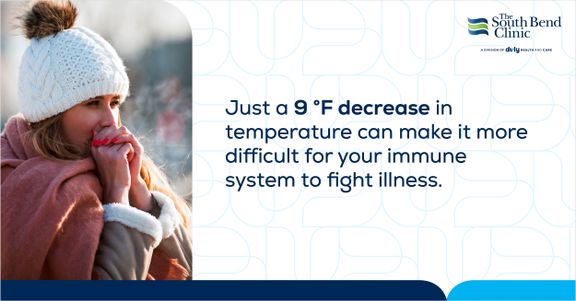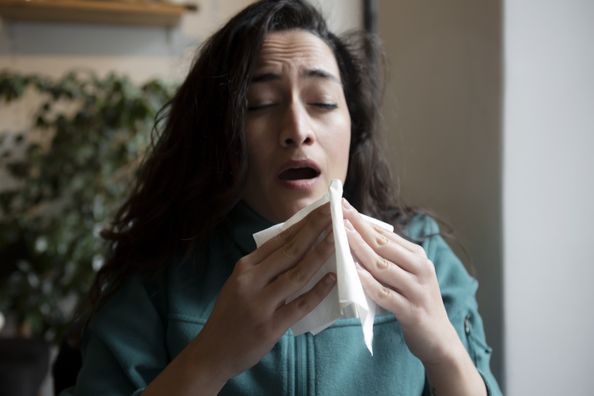Winter is in full swing – and that means that winter illnesses are, too.
Things like the flu, colds, respiratory viruses, and COVID-19 can occur at any time of the year, but they tend to peak during the colder months. That’s why having a healthy immune system to fight off illnesses is always important, but even more critical in the winter.
Why You Get Sick During the Winter
Whether you stay inside or brave the cold outdoors, the risk for certain illnesses is higher as the temperatures drop. There are several theories as to why winter brings on waves of sickness.
When You Stay Inside
When it’s cold outside, we typically spend more time inside. And if you spend that time indoors with others, your space can quickly turn into a petri dish of germs. Each person brings in their own germs, and these germs can easily spread and multiply.
Also, indoor heating systems can make the air in your home drier. Dry air may allow viruses to enter your body quicker, and increase your chance of getting sick.
When You Venture Outside
There’s been some back and forth in the past about whether cold weather itself can cause illness. For years, we heard warnings to wear hats and gloves during the winter (or we’ll “catch our death of cold out there”). Then, we were told that this was a myth. But now, recent research is showing that those “myths” might not be myths after all.
According to this new research, tiny structures called extracellular vesicles (EVs) inside your body may be a key factor in why some illnesses are more common in the winter. EVs play a role in your immune response. When certain bacteria or respiratory viruses enter your nose, your body releases billions of EVs into your mucus. The EVs then surround and kill the bacteria and viruses, keeping you healthy.
During the winter, decreases in temperature can change the make-up of EVs, making them less effective. Decreases also greatly limit the number of EVs available. This can even happen with small temperature drops – as little as a 9 degrees Fahrenheit (°F) decrease is enough to cut down EVs by more than 40%. With fewer and less effective EVs, your body may have more trouble fighting illness than it does in warmer temperatures.
Also read: Navigating Orthopaedic Recoveries Throughout Winter

Boosting Your Immune System
When the cold temperatures kick in, it’s time to give your immune system a little more love. Focus on maintaining healthy habits that are important year-round, but often tend to slip during the winter months.
Eating More Nutrients
There’s nothing like indulging in your favorite comfort foods, like mac and cheese or a warm cup of hot cocoa on a winter day. It’s okay to splurge once in a while (as long as you don’t have a medical condition where it’s dangerous to do so), but eating these foods all the time isn’t the best idea. Many of these foods lack key nutrients that your immune system needs. If you fill up on comfort foods, it can be easy to skip out on others that have those immune-boosting nutrients.
Some of the most important nutrients and nutrient-rich foods include:
- Vitamin C
- Berries, melons, citrus fruits, broccoli, tomatoes, bell peppers, orange juice, cabbage
- Vitamin D
- Eggs, fatty fish, milk fortified with vitamin D, white mushrooms, leafy greens
- Zinc
- Beef, seafood, tofu, nuts, beans
- Probiotics
- Kefir, kimchi, yogurt, kombucha, sourdough bread, certain cheeses (e.g., Swiss, Gouda, or cheddar)
- Protein
- Eggs, yogurt, milk, beef, seafood, chicken, nuts, seeds, lentils, beans, peanut butter, hummus
- Beta carotene
- Spinach, broccoli, tomatoes, carrots, mangoes, sweet potatoes, cooked butternut squash, romaine lettuce
Dietary supplements can also help you get these essential nutrients. However, supplements aren’t right for everyone, and it’s possible to take too much of them. Talk to your provider before taking any supplements.
Read on Duly Health and Care: 5 Ways to Boost Your Immune System Through Your Gut
Keeping Up With Physical Activity
If you’re a little lax on physical activity during the winter, you’re not alone. Whether it’s due to the temptation to snuggle up under a blanket or because your typical exercise routine takes place outdoors, almost 60% of US adults say that they are less active in the winter than they are in warmer weather.
The trick is to adapt your exercise routine so that it’s both doable and safe during the winter. Look for exercises that you can do at home without investing in expensive equipment. For example, there are many free videos online with cardio, yoga, dance, or no-equipment Pilates workouts that you can do right in your living room.
Also, you don’t necessarily have to give up on getting physical activity outdoors. When it’s not icy or frigid outside, bundle up and take a walk. Try out a wintertime activity like skating. Let out your inner child and go sledding (choose a tall hill so you can get a workout walking up). As long as you take precautions to stay safe, the cold doesn’t have to stop you from exercising outside.
Read on Duly Health and Care: Cold-Weather Exercising
Limit Alcohol Use
Research has shown that people living in colder climates tend to drink more alcohol. As temperatures drop and the sun sets earlier, alcohol consumption often increases.
Drinking too much alcohol can take a toll on your immune system. Alcohol can reduce the healthy bacteria in your gut that help your immune system function. Also, long-term or heavy alcohol use can lead to fewer cells that create antibodies to fight illness.
In general, healthy adults who are not pregnant, do not have medical conditions, and are not taking medications that make alcohol use unsafe can typically enjoy small amounts of alcohol without risk. The National Institute on Alcohol Abuse and Alcoholism recommends that women have 1 standard drink or less, and men have 2 or less, per day (a standard drink = 5 oz. glass of wine, 12 oz. beer, or a 1.5 oz shot of distilled spirits).
Read on Duly Health and Care: Sober-Curious: Benefits of an Alcohol-Free Lifestyle
It’s not always possible to prevent illness. But by keeping your immune system strong, you’re on your way to reducing your risk of getting sick and enjoying a healthy, sniffle-free winter.
Whether you’re looking for more information about giving your immune system a boost, or you need treatment for a winter illness that made its way into your body, your primary care provider is here to help. Find a provider at the South Bend Clinic and schedule an appointment today.
Reviewed and approved by Robert Cassady, MD, Family Medicine Physician
Health Topics:


